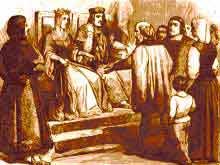
Chess Discovery in America
"Do you know that
Columbus' discovery of America was mainly due to a hard-fought game of
chess," asks David A. Mitchell, chess editor of the Philadelphia Public
Ledger. According to an old Spanish tradition, Ferdinand of Spain used to
pass the closing hours of each day over the chessboard, his principal
antagonist being an old grandee, whose skill put the monarch's power to a
severe test.
Columbus had long been dancing attendance at the court, in
pursuance of the one object of his life - the grand expedition in search
of a new world - and although he had hitherto failed in his aim he had
enlisted the sympathies of the good Queen Isabella.
The day arrived when the great navigator was to receive his final
answer. He wended his way toward the palace at nightfall, more with the
intention of ...[misprint]...
any hope of success. Isabella, however, had not resigned herself and
Columbus to defeat, and upon being notified of her favorite's arrival she
sought the king, who, being absorbed in a close game with the old grandee,
was in no mood to be bothered by the importunate sailor.
The queen's interruption had the effect of merely distracting the
monarch's attention, causing him to lose his principal piece, which was
followed by a volley of imprecations on sailors in general and Columbus in
particular. The game grew worse and worse and defeat stared the king in
the face, while the grandee chuckled as loudly as he dared.
Now, Isabella had considerable knowledge of the game, and when Ferdinand
told her that her protégé should be successful or otherwise, according to
the result of the game, she immediately bent all her energies on the
board.
The contest had been unusually long, and the courtiers clustered
around the table, much amused at the excitement of the king and the smug
satisfaction of the old grandee. And so the game, which was to decide the
discovery of a new world, went on until Isabella leaned toward her husband
ear, and exclaimed:
"You can checkmate him in four moves!"
In the utmost astonishment, the king reexamined the game and found
that his wife was correct.
In a few minutes the game was won, and the king rose and announced
that Columbus should depart on his voyage of discovery, with the title
"Admiral of the Fleet."
|

Columbus at the
court of Spain
Columbus' Financing
To keep Columbus from taking his ideas elsewhere, he was
put on a salary for seven years. After continually lobbying at the Spanish
court, he finally had success in 1492. Ferdinand and Isabella had just
conquered Granada, the last Muslim stronghold on the Iberian peninsula,
and they received Columbus in Córdoba, in the Alcázar castle. Isabella
turned Columbus down on the advice of her confessor, and he was leaving
town in despair, when Ferdinand intervened. Isabella then sent a royal
guard to fetch him and Ferdinand later rightfully claimed credit for being
"the principal cause why those islands were discovered". King Ferdinand is
referred to as "losing his patience" in this issue, but this cannot be
proven.
About half of the financing was to come from private Italian investors,
whom Columbus had already lined up. Financially broke after the Granada
campaign, the monarchs left it to the royal treasurer to shift funds among
various royal accounts on behalf of the enterprise. Columbus was to be
made "Admiral of the Seas" and would receive a portion of all profits. The
terms were unusually generous, but as his own son later wrote, the
monarchs did not really expect him to return.
According to the contract that Columbus made with King Ferdinand and Queen
Isabella, if Columbus discovered any new islands or mainland, he would
receive many high rewards. In terms of power, he would be given the rank
of Admiral of the Ocean Sea (Atlantic Ocean) and appointed Viceroy and
Governor of all the new lands. He has the right to nominate three persons,
from whom the sovereigns would choose one, for any office in the new
lands. He would be entitled to 10 percent of all the revenues from the new
lands in perpetuity; this part was denied to him in the contract, although
it was one of his demands. Finally, he would also have the option of
buying one-eighth interest in any commercial venture with the new lands
and receive one-eighth of the profits.
Columbus was later arrested in 1500 and supplanted from these posts, which
led to Columbus's son taking legal action to enforce his father's
contract, who was also arrested. Many of the smears against Columbus were
initiated by the Spanish crown during these lengthy court cases
the above
account culled from Wikipedia |

